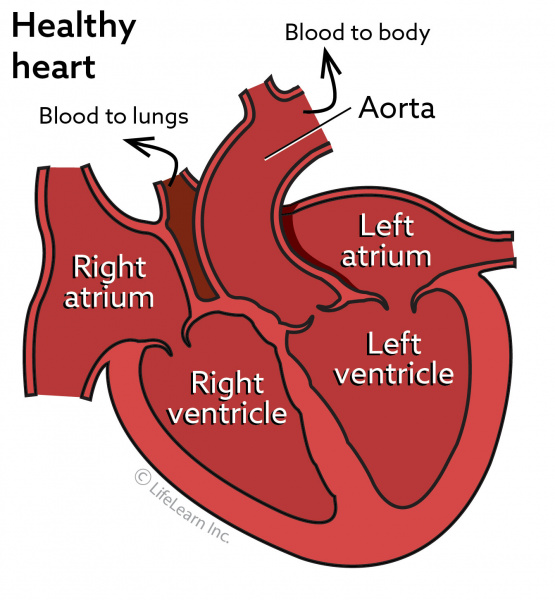what causes a dog to have a heart attack
What is congestive middle failure? 
Congestive centre failure (CHF) is a term that refers to the eye's inability to pump adequate blood to the trunk. In that location are many causes of CHF in dogs. The two most common causes are:
- mitral valve insufficiency (MVI). MVI is a leaky mitral valve, which is the valve between the left atrium and the left ventricle.
- dilated cardiomyopathy (DCM).
For further information on these specific causes, please see the handouts "Dilated Cardiomyopathy in Dogs" and "Mitral Valve Illness in Dogs".
Clinical signs of CHF vary depending on whether the dog has left- or right-sided heart failure.
What is the difference between right-sided and left-sided CHF?
Right-sided congestive center failure (RS-CHF) causes poor venous blood return to the middle. In other words, when the heart contracts or pumps, instead of the correct ventricle pushing the blood through the lungs for oxygenation, some blood leaks through the tricuspid valve (the valve betwixt the right atrium and right ventricle) back into the right atrium. This blood backs up into the systemic circulation (the main apportionment of the torso) and consequently becomes congested. Fluid accumulates in the abdomen, interfering with the part of the organs in these areas. The abdomen may fill with fluid, a condition chosen ascites. Fluid may also leak from veins in the limbs, causing swelling, known as peripheral edema.
In left-sided congestive heart failure (LS-CHF), when the eye contracts or pumps, instead of the left ventricle pushing the blood into the systemic circulation, some blood leaks through the mitral valve dorsum into the left atrium and so it backs upwards into the lungs. Fluid then seeps into the lung tissue resulting in pulmonary edema. This causes coughing and difficulty breathing. Left-sided congestive centre failure (LS-CHF) is the about common form of congestive heart failure. The classic signs of centre failure, coughing and fluid in the chest, are most normally acquired by LS-CHF.
Is CHF due mainly to heart valve illness?
CHF is well-nigh usually acquired by valvular insufficiency. It is estimated that 80% of the canine CHF cases are caused past MVI. However, there are many other causes. Disease of the heart musculus (cardiomyopathy), irregularities of rhythm, and narrowing of some of the major claret vessels can also cause CHF. Initially, MVI results in left-sided congestive middle failure. If left untreated, the eye failure may progress to involve both sides of the heart.
What clinical signs should I await?
The near common clinical sign of congestive heart failure (CHF) is persistent coughing accompanied past difficulty animate. This is due mainly to pulmonary edema or the accumulation of fluid in the lungs. The enlarged centre will as well push against the trachea, causing irritation that can induce a cough.
"The most mutual clinical sign of congestive heart failure is persistent cough accompanied past difficulty animate."
Many dogs with CHF will tire out more than easily, take reduced stamina, and practise not engage in playing or walking as they once did. Coughing when at residue or sleeping, excessive panting, persistent loss of ambition, a swollen belly, and pale or bluish gums are also signs associated with eye failure. The dog will develop generalized weight loss and musculus wasting due to the furnishings of CHF on other body systems. If any of these signs develop in a pet with a middle murmur, notify your veterinarian immediately.
Exercise dogs accept centre attacks?
In humans a heart attack unremarkably refers to myocardial infarction (MI). Myocardial infarction refers to death of the cells in an area of the centre muscle or myocardium. Cell death is usually due to oxygen deprivation acquired by obstruction of the coronary blood vessels that supply claret to the heart muscles. Heart attacks are rare in dogs just unexpected and sudden death in dogs diagnosed with any grade of heart disease is possible.
How is CHF diagnosed?
As with any heart problem, diagnosis involves several tests:
Auscultation or listening to the eye with a stethoscope is the first step in diagnosing heart disease. Center murmurs are detected by auscultation; the murmur's location and intensity help determine its significance. The heart rhythm is assessed, and if there are concerns, the veterinarian may simultaneously palpate or feel the pulse to determine its force and rhythm. Finally, the lungs are assessed, looking for evidence of changes associated with heart failure.
Breast X-rays are taken to evaluate the size and shape of the heart and look for lung changes such as the presence of fluid.
Claret and urine tests are performed to requite an indication of whatever other disorders in the body. Liver and kidney office are oftentimes impaired in patients with heart disease.
An electrocardiogram (ECG) measures the electric action of the eye and allows authentic determination of both heart rate and rhythm. Whatsoever abnormal rhythms (arrhythmias or dysrhythmias) can be detected and evaluated. 
Ultrasound examination (echocardiogram) utilizes ultrasound waves to evaluate the center. The size and thickness of each centre chamber can be evaluated, and the effectiveness of the centre's contractions can be straight observed. Measurements can be taken to evaluate the center'south pumping efficiency.
Can't yous treat my canis familiaris without these tests?
Authentic diagnosis gives your veterinarian a much better guide to the type and extent of handling necessary. Today there is a wide pick of heart medications that tin be used to care for congestive centre failure and the treatment regime must exist tailored for each patient. Without these tests, your veterinarian is unable to determine the optimal handling for your pet, and may inadvertently cause more than harm than practiced. With proper treatment, many dogs are able to alive a normal life for many months to years.
Source: https://vcahospitals.com/know-your-pet/congestive-heart-failure-in-dogs
0 Response to "what causes a dog to have a heart attack"
Post a Comment